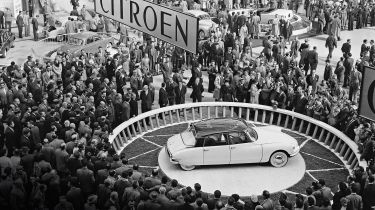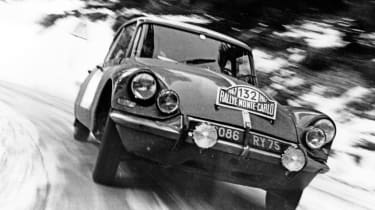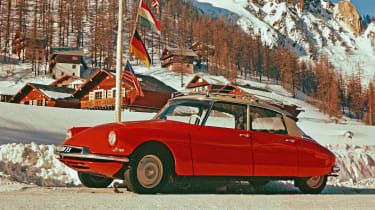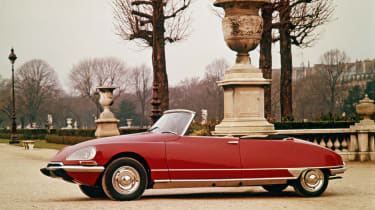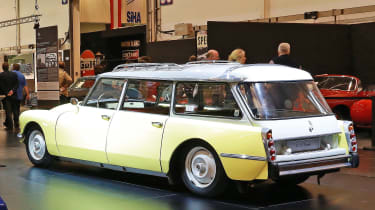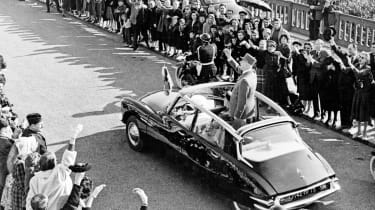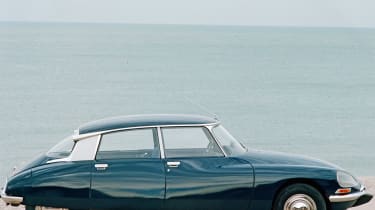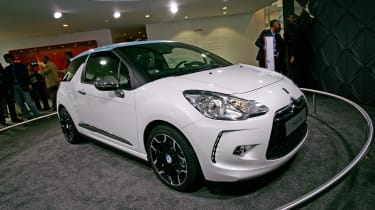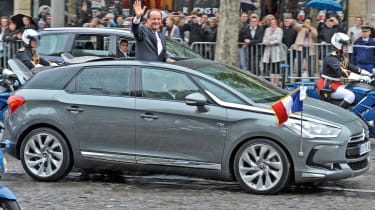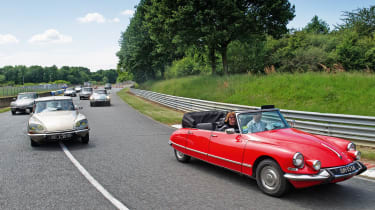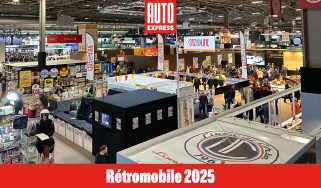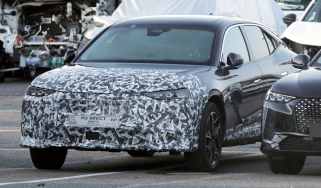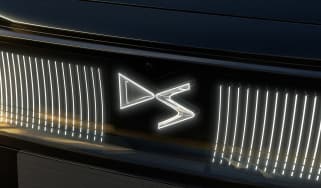DS: the history of Citroen luxury in pictures
We go back in time to explore the world of DS – from its 1955 show debut to brushes with French presidents
With DS now a brand in its own right and Citroen keen to return to its innovative roots with cars like the C4 Cactus, you might be wondering what all the fuss is about when it comes to the original Citroen DS. Well, to help you discover everything about the car we've put together an in-depth history of the Citroen DS - read on below or click through our gallery to find out more.
1955 Paris Motor Show
The DS made its first, stunning public appearance at a crowded Paris Motor Show in 1955. Thousands of people squeezed on to Citroen’s stand, eager to catch a glimpse of the futuristic new car. What they saw when the covers were removed was a model that instantly made all others look prehistoric.
Even 60 years on, it’s not hard to comprehend how outlandish the DS would have seemed to those Paris showgoers, who would have been more used to the upright design and agricultural underpinnings of typical fifties family saloons. Not only was the DS’s styling contemporarily out of this world, but the car also featured advanced hydraulics that powered everything from the self-levelling suspension to the disc brakes and the semi-automatic gearchange.
Yet none of these advanced features deterred buyers. Within 45 minutes of the DS’s covers being pulled off, 749 buyers had taken the plunge. And by the end of the day, Citroen had 12,000 firm orders.
1956 DS wins Monte Carlo rally
You’d expect style, sophistication and space from the DS, but surely not an impressive motorsport pedigree? Well, you’d be wrong, because the big Citroen notched up two Monte Carlo rally victories, plus a string of successes in long-distance marathon events.
The DS’s first competitive outing was in the 1956 Monte, where it won its class. Three years later, an ID 19 took overall honours in the same event on its way to winning the European Rally Championship. A second Monte triumph was achieved in 1966 before the DS’s efforts were focused on long-distance events such as the Rallye du Maroc and London to Sydney Marathon, where it took numerous victories.
1957 Citroen ID
IN an effort to attract buyers put off by the DS’s mechanical complexity, Citroen launched the ID in 1957. Essentially an entry-level model, it retained the DS’s head-turning looks and hydro-pneumatic suspension, but ditched the hydraulically powered brakes, steering and gearshift.
The resulting mix of value, style and sophistication proved an instant hit, and before long the ID was outselling the pricier DS. The differences between the cars were reduced over the years, though. Hydraulic brakes, power-steering and more powerful engines were added, and by the time production ended in 1975 there was very little separating the two.
1958 Chapron cabriolet
One of the most desirable and sought-after DS models is the gorgeous Chapron cabriolet. The brainchild of famed Parisian coachbuilder Henri Chapron, the hand- crafted four-seat drop-top made its debut in 1958.
While the conversion to a convertible was fairly straightforward, high prices meant that only 523 found homes before production ended in 1962. However, that wasn’t the end of open-air thrills in a DS, as Citroen pulled the covers off its own cabriolet in 1960, yet production was again entrusted to Chapron.
When sales ended in 1971, a total of 1,315 DS and ID cabriolets had been made. And due to the DS cabriolet’s stunning lines and incredible rarity, it’s no surprise that examples sell for more than £250,000.
1959 ID estate
Buyers wanting a DS with even more space had to wait for the ID estate, or Safari, to arrive in 1959. Despite its name, it was more DS than ID, as it had the more expensive model’s powered brakes and uprated engines, plus power-steering was optional.
Yet it was the estate’s versatility that really stood out. You could have six, seven or even eight seats, but perhaps the most famous version is the ambulance, which featured a stretcher, a chair for the paramedic and space for the medical kit. Plus, live horse racing in the seventies and eighties was often beamed from a camera mounted on a modified DS Safari – its supple suspension was perfect for keeping the lens steady at speed.
1962 Charles de Gaulle and the DS
After proving a hit with the public, the DS soon gained the presidential seal of approval from Charles de Gaulle.
In fact, the French leader owes his life to the big Citroen, after it played a big part in foiling an assassinationattempt in 1962 by a French paramilitary group.
Despite being sprayed with more than 100 bullets that ripped through its bodywork and punctured its tyres, the DS’s advanced hydro-pneumatic self-levelling suspension helped the driver retain control, allowing the president and his wife to make a speedy escape.
Four years later, De Gaulle was presented with a special DS Presidential, designed and built by coachbuilder Henri Chapron. The vast one-off was 6.3 metres long and featured extra cooling and revised gearing that allowed it to crawl through presidential parades at 3mph.
1968 DS facelift
Nearly 13 years after its launch, the DS still looked more modern than most cars on the road, yet that didn’t stop designers giving the saloon a nip and tuck in 1968.
The biggest change was reserved for the nose, which featured distinctive and innovative faired-in headlamps – improving aerodynamics and boasting a pioneering directional function. Thanks to a clever steering mechanism, the lights followed the corners as you turned the wheel.
Plus, the units were also linked to the suspension, helping keep the beams level. Elsewhere, the DS was treated to a powerful 2.3-litre fuel injected engine.
2009 DS 3 launch
Almost 35 years after the last DS rolled off the production line, the famous badge returned with a bang when the wraps were pulled off the DS 3 at the 2009 Frankfurt Motor Show. Featuring daring looks, endless personalisation options and a fun driving experience, the posh supermini was an instant hit.
It was designed to rival premium models such as the MINI and Fiat 500, and rejected these cars’ retro styling cues in favour of bold, modern lines inside and out. Quality was also a priority, and the DS 3 had a top-notch finish and plenty of big-car kit. In 2012, the drop-top Cabrio joined the line-up, and today the DS 3 is the brand’s biggest seller in the UK.
2012 President Hollande's DS 5
Charles de Gaulle isn’t the only French president to have fallen in love with DS, as current leader Francois Hollande took delivery of a DS 5 in 2012. As you’d expect for someone in the public eye, the President chose the ultra-efficient Hybrid4 model.
Combining a frugal 2.0-litre diesel and powerful electric motor, the four-wheel-drive DS 5 claims 72.4mpg and emits just 103g/km of CO2. Unlike De Gaulle’s bespoke 1966 Chapron saloon, the latest presidential limo features few modifications.
There are flag holders on each front wing, but the biggest addition is a full-length sunroof – not available on production versions – that allows Hollande to wave to crowds on special occasions.
2015 DS Parade
When it came to marking the DS’s 60th birthday, nothing less than a huge party would do – and the brand didn’t disappoint. DS hosted a week-long celebration in May 2015 that included a vast DS exhibition at the Jardin des Tuileries, Paris. Featuring installations, shops and cars that played a significant part in the past, present and future of DS, the special event hosted celebrities and VIPs, before opening its doors to the public for two days.
However, the real highlight was the parade of more than 700 classic DS cars from over 10 countries. The group gathered together at the Linas-Montlhéry track outside Paris for a day, before travelling in a convoy to the Place de la Concorde in the heart of the city. On the way the cars visited significant locations, including the Quai de Javel – the site of the old factory.
Now read the latest DS news, with a crossover DS 4 on the way.
Find a car with the experts
